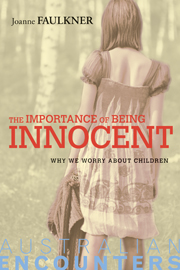Book contents
Encounters with childhood
Published online by Cambridge University Press: 05 July 2011
Summary
In recent years no issue has evoked more community passion and angst than the fear that childhood innocence is under threat. Asking difficult questions to uncover truths has always been the philosopher's burden and in The Importance of Being Innocent, philosophy scholar Joanne Faulkner does just that with the growing anxiety that the innocence of our children is no longer sacred.
Threats to childhood innocence have been the subject of a succession of moral panics: the commercial exploitation of children; physical and behavioural disorders; the early sexualisation of pre-adolescent ‘tweenies’; exposure to media violence and internet porn; child abuse and neglect; and most alarming of all, sexual predation by paedophiles. The other side is a middle-class obsession with perfecting the childhood experience, as ‘helicopter’ parents with fewer children regulate a regime of value-adding activities and tuition. Faulkner asks if adults in fact fetishise the innocence of children, to compensate for their own feelings of alienation and powerlessness.
- Type
- Chapter
- Information
- The Importance of Being InnocentWhy We Worry About Children, pp. vii - viiiPublisher: Cambridge University PressPrint publication year: 2010



